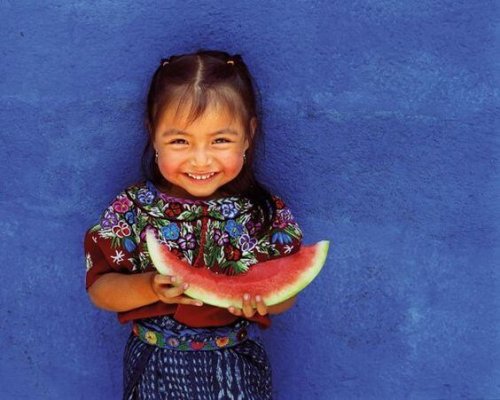5 Risks of Giving Too Much Fruit Juice to Children


Written and verified by the nutritionist Saúl Sánchez Arias
Fruit juice is an ideal food for children. Its nutritional properties are unquestionable; however, pediatricians have warned about the risks of going overboard with the consumption of these beverages.
According to studies conducted by the American Academy of Pediatrics, excessive administration of fruit juices can damage children’s health in different elements of their system.
Fruit juice in children’s diet
Without fear of being wrong, we parents prefer to give our children those products that are natural, but in the case of some of them, their composition could be the key to considering them risky or not.
Although fruit juice isn’t bad in and of itself, excessive consumption of fruit juice could bring health problems related to nutrition, the digestive system, or teeth.
As we know, even the healthiest option, such as juices squeezed at home, could bring consequences to our health if we consume them in excess. In the case of fruits, it’s a food with infinite properties, but when processed, could be a negative contribution according to the amount consumed, according to a study published in the journal “Pediatrics“.
Juices have become a food of great acceptance among the child population, they are also easy to prepare and serve. They’re also an excellent alternative to calm hunger. For parents, they’re a healthy option, which to a large extent replaces candy, soda, or sweets designed for children.

Proof of this is that in recent decades, the intake among the child population has continued to increase. This growth has been driven by greater accessibility and variety in supply. But it has also raised the voices of experts who warn about the possible health risks. Let’s see what they are.
What should we be concerned about when it comes to fruit juice?
So far, there’s no reason to say that fruit juice is harmful to children’s health. We’re only concerned about the risks associated with excessive consumption. Not surprisingly, specialists have revealed that it could harm children’s health.
The main reason for concern about this food is sugar because as far as we know, the pleasant taste that children find in this product is its sweetness. Although we can affirm that sweets are only a risk when they’re consumed too much, the same happens when we give them sweet drinks, even if they’re of natural origin.
In any case, the natural sugar in fruits isn’t as harmful as processed sugar. However, according to a study published in “The Journal of Clinical Investigation”, this element could also be harmful if we overdo it.

1. Lack of nutrients
Potential malnutrition is an effect that pediatricians fear when giving too much fruit juice to children. This outcome is possible because consumption of the juice can decrease a child’s appetite. Parents may believe that they’re being well-fed, but they’re missing out on the nutrients needed to supplement their diet.
Similarly, the particular characteristics of each juice don’t allow it to contain all the essential elements to ensure better nutrition. That is, they lack the necessary amount of fats, proteins, most vitamins, and in the case of packaged juices, they also lack fiber.
2. Fruit juice and dental cavities
The appearance of dental cavities in children has been associated with the presence of sugar and polysaccharides in the diet, due to the prolonged exposure of the teeth to this component. This is aggravated if fruit juice is ingested with a straw, bottle, or throughout the day.
3. Diarrhea and flatulence
Fruit juices contain 4 types of sugars, some of which may present difficulties in their absorption. When this happens, the carbohydrates are fermented by bacteria in the colon, generate an osmotic difference, and can cause diarrhea.
In addition, when consumed in excessive amounts, juices can cause chronic diarrhea, flatulence, bloating, and abdominal pain. Fructose and sorbitol are two of the sugars most implicated in this problem.
4. Excess weight
The relationship between fruit juice intake and obesity exists, although long-term studies are currently lacking to verify the observations. Due to their high caloric content, in excess, they could produce an energy imbalance.
What we do know at the moment is the long-term relationship between an excess of sugar and the existence of metabolic imbalances. To date, increased intake is associated with obesity, type 2 diabetes, and other cardiometabolic risks (as can be seen in the conclusions of the aforementioned study in the Journal of Clinical Investigation).
5. Fruit juice can displace the consumption of whole fruits
From a certain age, fruit juices are an appetizing product because of their taste and are much easier to consume than whole fruits. They come in attractive packaging and can be carried and consumed throughout the day. In addition, parents tend to see it as a healthy product, so there’s usually no limit to their intake.
Estimated consumption by age
The intake of this natural food is regulated in terms of quantity, but it all depends on the age of the child. In this regard, the American Academy of Pediatrics recommends that limits be set on its administration according to nutritional needs, the child’s weight, and other age-related characteristics.
Consequently, according to the regulation proposed by experts, children should consume fruit juice according to the following criteria:
- Children under six months of age are contraindicated, especially because breast milk is the only food they should receive at this stage. Therefore, it’s considered a mistake to give them a bottle of juice to quench their thirst or hunger at this age.
- For infants under one year of age (between 6 and 12 months), fruit juice doesn’t provide any additional benefit. For this reason, it’s best avoided at this stage of life. If it’s indicated for medical reasons, it should be offered in a cup and never in a bottle.
- Children between twelve months and six years of age shouldn’t drink more than half a glass per day. In other words, giving them more than 4 ounces per day may be considered excessive. Likewise, it should be part of a meal or snack, and not be ingested alone.
- After the age of seven, children can drink a glass of juice a day (8 ounces), but more than this may be an excess.
- It’s also not recommended that fruit juice be given before bedtime or as a treatment for dehydration or diarrhea.
Fruit juice isn’t necessary for children’s diet but can be offered in moderation
Juice intake can be a strategy to increase fruit consumption in children. However, it shouldn’t be the only way to provide these foods. It’s important to get children used to eating whole fruits, as the fiber content minimizes the impact of fructose on the metabolism.
Fruit juice is an ideal food for children. Its nutritional properties are unquestionable; however, pediatricians have warned about the risks of going overboard with the consumption of these beverages.
According to studies conducted by the American Academy of Pediatrics, excessive administration of fruit juices can damage children’s health in different elements of their system.
Fruit juice in children’s diet
Without fear of being wrong, we parents prefer to give our children those products that are natural, but in the case of some of them, their composition could be the key to considering them risky or not.
Although fruit juice isn’t bad in and of itself, excessive consumption of fruit juice could bring health problems related to nutrition, the digestive system, or teeth.
As we know, even the healthiest option, such as juices squeezed at home, could bring consequences to our health if we consume them in excess. In the case of fruits, it’s a food with infinite properties, but when processed, could be a negative contribution according to the amount consumed, according to a study published in the journal “Pediatrics“.
Juices have become a food of great acceptance among the child population, they are also easy to prepare and serve. They’re also an excellent alternative to calm hunger. For parents, they’re a healthy option, which to a large extent replaces candy, soda, or sweets designed for children.

Proof of this is that in recent decades, the intake among the child population has continued to increase. This growth has been driven by greater accessibility and variety in supply. But it has also raised the voices of experts who warn about the possible health risks. Let’s see what they are.
What should we be concerned about when it comes to fruit juice?
So far, there’s no reason to say that fruit juice is harmful to children’s health. We’re only concerned about the risks associated with excessive consumption. Not surprisingly, specialists have revealed that it could harm children’s health.
The main reason for concern about this food is sugar because as far as we know, the pleasant taste that children find in this product is its sweetness. Although we can affirm that sweets are only a risk when they’re consumed too much, the same happens when we give them sweet drinks, even if they’re of natural origin.
In any case, the natural sugar in fruits isn’t as harmful as processed sugar. However, according to a study published in “The Journal of Clinical Investigation”, this element could also be harmful if we overdo it.

1. Lack of nutrients
Potential malnutrition is an effect that pediatricians fear when giving too much fruit juice to children. This outcome is possible because consumption of the juice can decrease a child’s appetite. Parents may believe that they’re being well-fed, but they’re missing out on the nutrients needed to supplement their diet.
Similarly, the particular characteristics of each juice don’t allow it to contain all the essential elements to ensure better nutrition. That is, they lack the necessary amount of fats, proteins, most vitamins, and in the case of packaged juices, they also lack fiber.
2. Fruit juice and dental cavities
The appearance of dental cavities in children has been associated with the presence of sugar and polysaccharides in the diet, due to the prolonged exposure of the teeth to this component. This is aggravated if fruit juice is ingested with a straw, bottle, or throughout the day.
3. Diarrhea and flatulence
Fruit juices contain 4 types of sugars, some of which may present difficulties in their absorption. When this happens, the carbohydrates are fermented by bacteria in the colon, generate an osmotic difference, and can cause diarrhea.
In addition, when consumed in excessive amounts, juices can cause chronic diarrhea, flatulence, bloating, and abdominal pain. Fructose and sorbitol are two of the sugars most implicated in this problem.
4. Excess weight
The relationship between fruit juice intake and obesity exists, although long-term studies are currently lacking to verify the observations. Due to their high caloric content, in excess, they could produce an energy imbalance.
What we do know at the moment is the long-term relationship between an excess of sugar and the existence of metabolic imbalances. To date, increased intake is associated with obesity, type 2 diabetes, and other cardiometabolic risks (as can be seen in the conclusions of the aforementioned study in the Journal of Clinical Investigation).
5. Fruit juice can displace the consumption of whole fruits
From a certain age, fruit juices are an appetizing product because of their taste and are much easier to consume than whole fruits. They come in attractive packaging and can be carried and consumed throughout the day. In addition, parents tend to see it as a healthy product, so there’s usually no limit to their intake.
Estimated consumption by age
The intake of this natural food is regulated in terms of quantity, but it all depends on the age of the child. In this regard, the American Academy of Pediatrics recommends that limits be set on its administration according to nutritional needs, the child’s weight, and other age-related characteristics.
Consequently, according to the regulation proposed by experts, children should consume fruit juice according to the following criteria:
- Children under six months of age are contraindicated, especially because breast milk is the only food they should receive at this stage. Therefore, it’s considered a mistake to give them a bottle of juice to quench their thirst or hunger at this age.
- For infants under one year of age (between 6 and 12 months), fruit juice doesn’t provide any additional benefit. For this reason, it’s best avoided at this stage of life. If it’s indicated for medical reasons, it should be offered in a cup and never in a bottle.
- Children between twelve months and six years of age shouldn’t drink more than half a glass per day. In other words, giving them more than 4 ounces per day may be considered excessive. Likewise, it should be part of a meal or snack, and not be ingested alone.
- After the age of seven, children can drink a glass of juice a day (8 ounces), but more than this may be an excess.
- It’s also not recommended that fruit juice be given before bedtime or as a treatment for dehydration or diarrhea.
Fruit juice isn’t necessary for children’s diet but can be offered in moderation
Juice intake can be a strategy to increase fruit consumption in children. However, it shouldn’t be the only way to provide these foods. It’s important to get children used to eating whole fruits, as the fiber content minimizes the impact of fructose on the metabolism.
All cited sources were thoroughly reviewed by our team to ensure their quality, reliability, currency, and validity. The bibliography of this article was considered reliable and of academic or scientific accuracy.
- Abrahams S. A. Weighing in on fruit juice: AAP now says no juice before age 1. American Academy of Pediatric News. Mayo 2017.
- Dennison B. A. Excess fruit juice consumption in preschool aged children is associated with short stature and obesity. Pediatrics. Enero 1997. 99 (1): 15-22.
- Hannou SA., Haslam DE., McKeown NM., Herman MA., Fructose metabolism and metabolic disease. J Clin Invest, 2018. 128 (2): 545-555.
- Harvard Health Publishing. News briefs: eating fruit is better for you than drinking fruit juice. Harvard Medical School. Diciembre 2013.
- Heyman MB., Abrams SA., Fruit juice in infants, children, and adolescents: current recommendations. Pediatrics, 2017.
- Hoekstra J. H, van der Aker J. H, et al. Fluid intake and and industrial processing in apple juice induced chronic non-specific diarrhoea. Archives of Disease in Childhood. Agosto 1995. 73 (2): 126-30.
- König K. G, Navia J. M. Nutritional role of sugars on oral health. American Journal of Clinical Nutrition. Julio 1995. 62 (1 Suppl): 275S-282S.
- Wójcicki J. M, Heyman M. B. Reducing childhood obesity by eliminating 100 % fruit juice. American Journal of Public Health. Septiembre 2012. 102 (9): 1630-1633.
This text is provided for informational purposes only and does not replace consultation with a professional. If in doubt, consult your specialist.








